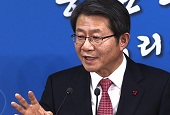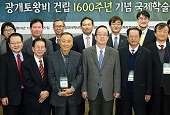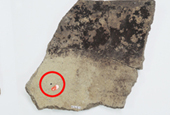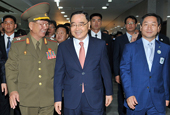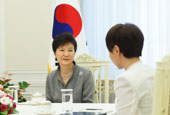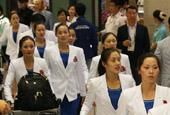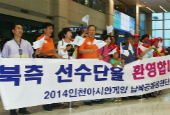South Korea will provide funds from its South-North Cooperation Fund to help with a North Korean population census.
The South Korean government agreed to provide KRW 1.4 billion (USD 1.3 million) from its South-North Cooperation Fund to help with the United Nations Population Fund's (UNFPA) North Korea census, at a South-North exchange & cooperation promotion meeting on January 29.
The UNFPA asked for financial assistance for its North Korea census conducted last year, as well as for subsequent analysis and reporting, and for training North Korean workers. Government assistance will be provided over the next two years through the end of 2016.
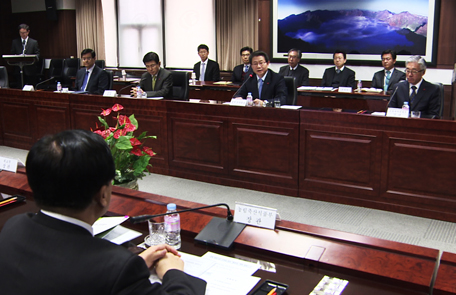
"The North Korean census will be used as a basic reference point for more effective international assistance for North Korea, such as providing nutrients to North Korean babies and infants," said an official from the Ministry of Unification.
In addition, the government will also tap its South-North Cooperation Fund to help manage the "Korean Peninsula future of reunification" center, the Kaesong Industrial Park, and the inter-Korea exchange & cooperation association. It will also support the publishing of a Korean language dictionary in a bid to recover a sense of shared language between the Korean people and overcome differences in the Korean language as used in the South and the North.
The government also laid out tasks to improve inter-Korea relations. As the first task for inter-Korea exchanges this year, the government intends to help build infrastructure to form an economic community between the two countries and to promote mutually beneficial inter-Korea economic cooperation. The tasks include establishing a master plan for developing the Korean Peninsula, connecting inter-Korea and continental railways, starting shipping and transport operations in the Rhajin-Khasan area, internationalizing the Kaesong Industrial Park and training North Korean human resources.
Secondly, in order to improve the quality of life of North Koreans, the government hopes to expand its support for mothers and their infants and form an agricultural complex in North Korea.
Thirdly, in cooperation with international agencies and private organizations, it plans to help preserve North Korea's forests and the cross-peninsular Baekdudaegan Mountain Range. It also intends to cooperate with North Korea on managing rivers that flow in both territories, such as the Imjingang River and the Bukhangang River, and form a "World Eco-Peace Park" in the DMZ.
Fourthly, the government also laid out ways to recover a sense of community between the two Koreas and to preserve the Korean people's cultural heritage. It hopes to establish inter-Korea cultural centers in both Seoul and Pyongyang, and publish a handbook about the Korean people's lives and culture.
Finally, the government plans to form a joint committee to hold celebrations to mark the 70th anniversary of Korea's liberation from Japanese colonial rule and various types of cultural, religious and sporting events.
By Limb Jae-un
Korea.net Staff Writer
jun2@korea.kr

The South Korean government agreed to provide KRW 1.4 billion (USD 1.3 million) from its South-North Cooperation Fund to help with the United Nations Population Fund's (UNFPA) North Korea census, at a South-North exchange & cooperation promotion meeting on January 29.
The UNFPA asked for financial assistance for its North Korea census conducted last year, as well as for subsequent analysis and reporting, and for training North Korean workers. Government assistance will be provided over the next two years through the end of 2016.

On January 29, the government agreed to provide part of its South-North Cooperation Fund to help with the UNFPA's North Korean census. The photo above shows a previous South-North exchange & cooperation promotion meeting.
"The North Korean census will be used as a basic reference point for more effective international assistance for North Korea, such as providing nutrients to North Korean babies and infants," said an official from the Ministry of Unification.
In addition, the government will also tap its South-North Cooperation Fund to help manage the "Korean Peninsula future of reunification" center, the Kaesong Industrial Park, and the inter-Korea exchange & cooperation association. It will also support the publishing of a Korean language dictionary in a bid to recover a sense of shared language between the Korean people and overcome differences in the Korean language as used in the South and the North.
The government also laid out tasks to improve inter-Korea relations. As the first task for inter-Korea exchanges this year, the government intends to help build infrastructure to form an economic community between the two countries and to promote mutually beneficial inter-Korea economic cooperation. The tasks include establishing a master plan for developing the Korean Peninsula, connecting inter-Korea and continental railways, starting shipping and transport operations in the Rhajin-Khasan area, internationalizing the Kaesong Industrial Park and training North Korean human resources.
Secondly, in order to improve the quality of life of North Koreans, the government hopes to expand its support for mothers and their infants and form an agricultural complex in North Korea.
Thirdly, in cooperation with international agencies and private organizations, it plans to help preserve North Korea's forests and the cross-peninsular Baekdudaegan Mountain Range. It also intends to cooperate with North Korea on managing rivers that flow in both territories, such as the Imjingang River and the Bukhangang River, and form a "World Eco-Peace Park" in the DMZ.
Fourthly, the government also laid out ways to recover a sense of community between the two Koreas and to preserve the Korean people's cultural heritage. It hopes to establish inter-Korea cultural centers in both Seoul and Pyongyang, and publish a handbook about the Korean people's lives and culture.
Finally, the government plans to form a joint committee to hold celebrations to mark the 70th anniversary of Korea's liberation from Japanese colonial rule and various types of cultural, religious and sporting events.
By Limb Jae-un
Korea.net Staff Writer
jun2@korea.kr
